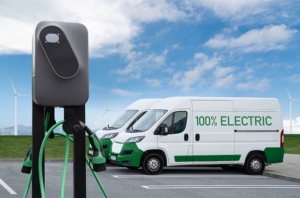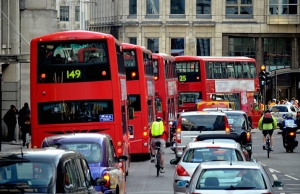Coalition Urges New Transport Secretary to Boost Electric Van Adoption
The coalition behind the Zero Emission Van Plan has urged the new Secretary of State for Transport, Louise Haigh, to take action to boost electric van usage in the UK. The coalition, including UK van manufacturer Stellantis and FN200, representing the largest fleet operators, emphasised the need to implement the Zero Emission Van Plan.
The plan advocates for enhanced charging infrastructure, removal of regulatory obstacles, and increased financial support. This appeal follows the Climate Change Committee's report highlighting that electric van sales are significantly off track, despite one in ten workers using such vehicles. Recent SMMT (The Society of Motor Manufacturers & Traders) data reveals that electric vans account for less than 5% of registrations in 2024.
The coalition has invited Haigh to visit a depot with electric vans to understand the challenges in achieving widespread adoption. Launched earlier this year, the Zero Emission Van Plan is a collaborative effort by BVRLA, Logistics UK, Recharge UK, the Association of Fleet Professionals (AFP), and The EV Café. A spokesperson for the plan stated, "Electric van registrations have stalled from an already low starting point. The ZEV mandate aims to boost supply, but demand remains low. Van operators face numerous challenges, including vehicle quality, performance, cost, and charging infrastructure."
The coalition calls for increased support, improved charging facilities, and regulatory reforms to make electric vans a viable option for millions of drivers. They urge the new government to take decisive action to support the transition.
Experts Urge Mandatory Speed Limiters for UK Vehicles to Boost Road Safety
Experts are urging the UK to make speed limiters mandatory on all vehicles to enhance road safety. This call coincides with the EU's implementation of the Vehicle General Safety Regulation, which took effect on July 6, 2022. This regulation mandates new safety features in all EU vehicles, including advanced emergency braking and intelligent speed assistance, but these measures are not yet mandatory in the UK.
The UK Department for Transport (DfT) is researching the potential impacts of adopting these rules, with an update expected soon. The DfT is also a member of the European New Car Assessment Programme, which encourages the use of many technologies included in the EU's safety regulation.
Introducing speed limiters could prevent over 1,700 deaths and 15,000 serious injuries in the next 16 years. AXA UK, along with the road safety charity Brake and other industry groups, is pressing the government to adopt these measures. Alain Zweibrucker, Retail CEO at AXA UK, emphasised that road crashes claim thousands of lives annually in the UK and that the new safety regulations could significantly improve safety for drivers, passengers, and pedestrians.
Intelligent speed assistance technology, which uses GPS and traffic sign data to warn drivers when they exceed speed limits, is one such feature that can automatically slow down a vehicle to ensure compliance with speed limits. The push for mandatory speed limiters is seen as a straightforward and effective way to improve road safety across the UK.
New Government Urged to Leverage Logistics Sector for Economic Growth
Following Labour's election victory, Logistics UK highlighted the sector’s potential to drive economic growth. As one of the UK’s largest sectors, logistics offers skilled jobs and helps remove barriers to opportunity.
David Wells OBE, Logistics UK’s Chief Executive, emphasised the sector’s importance: “Logistics supports households, businesses, and public services daily, employing 8% of the UK workforce. It is well-positioned to aid the new government in revitalising the economy, provided its needs are incorporated into the industrial strategy.”
Theres been calls for new administration to support the sector and ensure an efficient, cost-effective logistic structure - crucial for economical growth. Logistics UK is advocating for collaboration on infrastructure, decarbonisation, skills, innovation, and trade policies, aiming to boost the economy by up to £8 billion annually.
Wells underscored the need for clean, green growth and the creation of engaging roles to attract the next generation of logistics talent. Logistics UK urges the government to form a public-private partnership with the industry, ensuring logistics businesses are considered in all economic decisions. A dedicated minister for logistics and supply chain is recommended to integrate the sector's needs into government plans, enabling logistics to support the country's return to growth.
A Landslide Victory as Britain Wakes Up to a Labour Government
Keir Starmer proclaimed the "sunlight of hope" is shining again in Britain following Labour's resounding election win, ending 14 years of Conservative rule. Starmer is set to become prime minister after Rishi Sunak conceded, with Labour expected to secure over 410 seats compared to the Conservatives' 115.
Starmer, speaking at Royal Festival Hall in London, expressed relief and optimism, emphasizing a renewed opportunity for the country. The Conservatives faced their worst election performance, with key figures like Liz Truss, Jacob Rees-Mogg, and Grant Shapps losing their seats. Labour also made significant gains in Scotland and from the SNP, while the Liberal Democrats increased their seats to 70.
Reform UK saw a rise, winning at least four seats, with Nigel Farage becoming an MP. The Greens also won four seats. Notably, former Labour leader Jeremy Corbyn won in Islington North as an independent, and pro-Palestine independents had surprising victories.
Sunak acknowledged the defeat, emphasising the peaceful transfer of power. Labour's triumph is seen as a beacon of hope for progressive movements globally. The party reclaimed significant regions from the Conservatives, marking a major turnaround since Starmer took leadership. Labour is poised to implement substantial changes, with a focus on workers' rights, energy generation, and improved trading relations, while addressing critical issues like the NHS and prison system.
London Named Most Congested City in Europe for Third Year Running
London's roads have been ranked the most congested in Europe for the third consecutive year, with drivers spending an average of 99 hours in traffic in 2023, up from 97 hours in the previous year. This ranking, reported by traffic data supplier Inrix, places London behind only New York and Mexico City globally, excluding China and India.
It’s been well noted that traffic congestion has returned to pre-Covid travel levels, with the UK and Europe experiencing smaller increases in congestion compared to other regions. Despite London's high congestion, its drop to third globally indicates that other major cities have returned to pre-pandemic activity levels also - highlighting that increased congestion can signify strong economic activity.
Inrix data revealed a 3% rise in time lost to traffic compared to pre-Covid levels. On average, UK drivers spent 61 hours in traffic last year, up from 57 hours in 2022. Other heavily congested UK cities include Birmingham, Bristol, Leeds, and Wigan.
An RAC spokesperson, emphasised the negative impact of congestion, noting wasted time and fuel, and poor air quality. Cities have been urged to find solutions. While some measures like park-and-ride schemes can be costly, others, such as retiming traffic lights, are inexpensive and can improve traffic flow.










